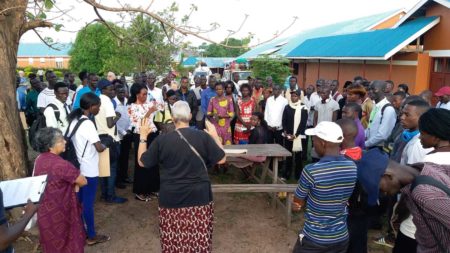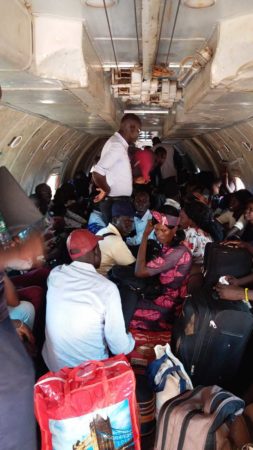To amuse myself somewhat during these strange days, I enquired of Google how long it would take me to walk to Limerick, Ireland from Yambio, South Sudan. Within 1.9 seconds I had my answer – 1,622 hours!! Quite a long walk. On a follow-up request re the amount of time driving would take, I was told that I would reach Limerick in 134 hours. Not too bad I suppose, the total distance being 9919 kilometers. The cycling time was not available, there being too many variables, Google said, and anyway, my bike was stolen last week.
Reflecting on why I had never thought of asking those particular questions in the last 5 years since July 2015 when I first came to South Sudan, I realise that it is because I now have no way to travel to Ireland. The airport in Juba is closed and even if a plane were to leave from there, there is no way for me to get to Juba, as all domestic flights have been discontinued. Unfortunately, flying is the only safe way to travel in this country.
But, as they do in the movies, let’s turn the clock back to six weeks earlier……..

At midday on Friday 20th March last, I attended a meeting at our college of our small team of Teaching Practice supervisors. The purpose of our meeting was to reflect on the week of supervision we had just completed and to plan for the following week. We had forty-seven students on teaching practice, in nine primary schools around Yambio, while seventy-three students continued with their classes in the college. When the end of classes bell rang at 4.30pm that afternoon, we were all happy that the weekend had begun. I conducted my normal music club that Friday night and the students were in great form as they too were looking forward to some rest and relaxation over the weekend.
However, the following morning, our college principal, Sr. Margaret Scott, called all the staff members together for an unscheduled emergency meeting in our community house. She informed us that the Vice-President of South Sudan had issued an order that all schools were to close immediately, due to the danger of COVID-19 (though it had not yet arrived in the country.) She had also received communication from the Executive Director of Solidarity with South Sudan saying that we had to close the college and send the students home. I was in shock. My mind had stopped at ‘close the college’, meaning to suspend all classes. As all our students are resident for the duration of their course, due to the great distances from their home places, sending the students home is a drastic measure.
The following two days passed in a blur of activity as we held meetings with the students to explain to them what was going to happen in the immediate future, while not being able to answer their questions about when they would come back or how they would continue with study is all I can remember. Transcripts of marks and achievement were prepared for everyone and statements of attendance were issued to all, in case it should happen that a student may not be able to return for one reason or another. There were many tears, expressing fear, loneliness, anger, helplessness, and other emotions we were unable to name. For young people who might only get one chance in life at education, to have it suspended so abruptly like this was very unsettling for them. We gathered all their communication details so as to keep in touch in the weeks and months to come.
In our concern for the welfare of our student body, no single community member or tutor spared a thought for their own situations, which actually had long-term consequences for some.
On Monday 23rd March, seventy of our students left by charter plane (in essence, a small cargo plane where they had to sit on their luggage on the floor), and the rest left the following day. Even as I think about it now, the tears come to my eyes. To walk, after their departure, through the empty classrooms and dormitories, which were hives of activity three days previously, was devastating.

As the members of the staff and community turned to look at one another later that afternoon, we realized that our purpose for being here had just gone. A number of us made efforts to leave Yambio, planning to return when the students came back, but the Government closed the airport to International flights on Tuesday night 24th March so we unpacked our bags and settled in for a long wait. There are eleven of us here together – seven religious from New Zealand, Peru, United States, Ghana, India and Ireland and four lay people from Uganda, Kenya, Italy and Australia.
COVID-19 has made its way to South Sudan. Because of the chaotic state of the country, we are not sure how many cases there are. We are not sure if anyone has died of it. We have no idea how the health system will cope, as there are about nine ventilators in the whole country!! We figure that the best way forward is to focus on prevention. So we are staying inside the compound for the most part and being careful about social distancing and hand hygiene.
We have started to make efforts to help our students to continue with their studies by using the limited communications systems in the country. Most of our students have no access to internet or have to travel quite a distance to access it and mobile phone coverage is impossible for some of them.
Thanks to Eternal Word Television Network (EWTN) and the Internet, I am able to attend Mass celebrated in Rome by Pope Francis every morning. We have a beautiful chapel in our compound and Jesus is fully present here with us all the time.
Any more than that, only God knows.
Ailish O’Brien rsm
South Sudan
South Central Province


